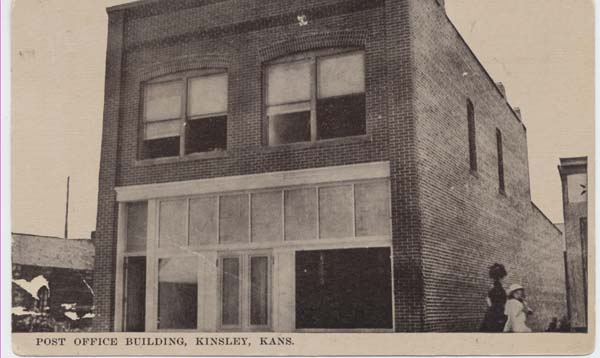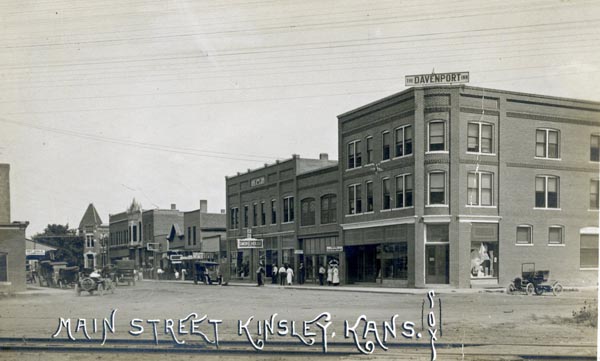I decided to research how Christmas was celebrated in Kinsley in by-gone years. Anyone who has ever read old newspaper knows that so many things catch your eye, and you end up discovering things you had not intended.
I found an article written by the Kinsley postmaster, Benjamin Franklin Tatum, in the December 18, 1919 issue of the Kinsley Graphic. With additional research, I learned that B. F. (as he was known) was born in 1854 in Newtonia, Missouri. He lived there until he married Sarah Hurst in 1879, and they moved to Comanche Co., KS. in 1889, before settling here in 1892.
B.F. had many enterprises during his life. He started out in cattle with a ranch five miles west on the Arkansas River. He had a drug store (1885-1900). He was elected to the Kansas House of Representatives for two terms (1900-1904). He was then elected mayor of Kinsley (1904-1909). In 1905 he had a hardware store before owning a garage in 1912. Finally, in 1914, he became Kinsley’s postmaster at the age of 60.
The headline of B.F.’s article, “Mailing Christmas Parcels”, caught my eye. It begins, “On account of the unreliability of train service and the unusual bulk of mail to be transported, the mails are very liable to be badly congested during the Holiday season between December 15th and January 1st. The Postal employees will do all that they can to give prompt and efficient service in the handling of the Christmas rush, and they will greatly appreciate any help which the public may give them in doing this.”

Our mail does not move by train anymore, but during this pandemic Christmas, the post office and UPS certainly are seeing a great volume of packages, and they have been encouraging us to mail early. In 1919, B. F. recommended three things that are still true today to better insure your packages arrive on time, “wrap parcels securely, address plainly and mail early”.
“Wrap parcels securely” reminds me of the song lyric, “Brown paper packages tied up with string”. According to B. F., “Parcels must not be sealed or stickers put over the string or over the edge of the paper on a parcel.” Packages had to be tied because Scotch tape was not invented until 1930. Even though we had tape when I was a child, my mother still taught me how to tie a package for mailing with string without using tape. Might be a fun activity for kids to do today; Google “square package lashing”.
(As a side note, until 1917, presents (not packages for mailing) were wrapped in solid colored tissue paper. In 1917, Hallmark of Kansas City ran out of colored tissue paper and substituted decorative French envelope lining paper. It sold so well, that from then on, they printed and sold their own decorative wrapping paper.)
B. F. also instructs that “Christmas seals should appear only on the back of parcels or letters.” In 1919, these stamps were being sold by the National Tuberculosis Association to combat one of the world’s deadliest killers. Like Covid 19, TB is airborne, and would not have a cure until antibiotics were invented in the 1940s.
According to B. F., “On December 20, 22, 23, and 24th, the back door in the Post Office lobby will be used as a parcel post window. You will mail your parcels and also accept parcels addressed to you at this window…. Do not put a message of any kind inside parcels. You indorse them, ‘Not to be opened till Christmas’.

In that same issue of the paper this separate announcement appeared: “The Postoffice will be open on Christmas Day between the hours of 9-11 a.m.”
These Christmas Day hours surprised me. However, after learning about B. F., I like to think they may have been a kindness so as not to disappoint children with an undelivered parcel. This is what it said in his obituary: “His affection for children was one of the beautiful characteristics of his generous nature, and they loved his merry greetings, wherever they met him.”
Just six months later, B.F. would die of a stroke at age 65 on May 5, 1920. He is buried in Hillside Cemetery.
B. F. Tatum’s obituary also says that he had to the “fullest degree the fine qualities of American manhood and business integrity. The love of the community came to him because he added all this, the savor of the kindliest heart and the friendliest disposition that a man ever had.”
We might all strive to have our obituaries read like B. F. Tatum’s. “The memory of a clean, active, generous, kindly life will always remain with those who are left. It is after all the choicest gift life can bestow upon us.”
